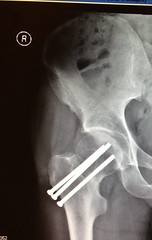This website uses cookies, including third party ones, to allow for analysis of how people use our website in order to improve your experience and our services. By continuing to use our website, you agree to the use of such cookies. Click here for more information on our and .

Managing delirium and dementia in hip fracture patients is a common challenge. In the lead-up to the 2nd annual Hip Fracture Management conference, we had the chance to ask some of our speakers about their organisations top strategies for recognising and managing delirious or confused patients.
Our interventions are:
- Evaluation by the orthogeriatrics program
- Identification of patients at high risk of delirium (using CAM)
- Delirium prophylaxis immediately post Sx using anti-psychotics in patients at high risk of delirium.
Gustavo Duque, Professor of Medicine, Head, Division of Geriatric Medicine, Department of Medicine & Director, Ageing Bone Research Program, Nepean Hospital
Understanding acute postoperative delirium requires a clear appreciation of the patient’s premorbid state of mind, and this is best understood by mental state assessment as soon as possible after presentation, combined with discussion with carers. Once you know what you are starting with, you have a better chance of detecting changes. Careful use of analgesia, avoidance of excessive opiates by use of nerve blocks and other techniques and gentle anaesthesia give best protection to the vulnerable patient. The most rapid return of elderly patients to familiar surroundings is also helpful, and so high-quality multidisciplinary care is very important.
Alasdair Sutherland, Orthopaedic Surgeon, Director of Orthopaedic Services, South West Healthcare
This is an area that we have improved dramatically over the past years. We as a team during pre-operative assessment look at the past medical histories and medications as to the chances of developing delirium postoperatively.
Management identify if possible the cause of the delirium. 1) Pain 2) infection 3) preceding dementia 4) medication induced, co morbidities i.e .Parkinson, organic brain syndromes and for substance withdrawal.
Management is driven by cause. We do not use unless under extreme circumstances antipyschotic agents such as haloperidol and olanzipine or long acting Benzodiazepine like diazepam and midazelam. The use of Oxazepam is used for withdrawal syndromes. Pain management is vital to maintain comfort as well to manage delirium, we use the Abbey pain scale for validation of use of analgesia and the use of sedation scores to identify if it is safe to administer.
We encourage families to participate in their care and the team is available to speak with them during the day.
We at present try to care for these patients in a single low stimulus room, with the use of one on one nursing if needed (if the patient is at risk of harming themselves by climbing out of bed).
Tracey Finigan, Acting Clinical Nurse, Neck of Femur Patient Flow, Gold Coast Hospital
- Recognise delirium as a medical emergency in perioperative setting- Geriatrican review
- Recognising analgesia requirements
- Close observation of patients
- Education of family and carers
- Adequate nutritional requirements
Chrys Pulle, Geriatrician Hip Fracture Unit, The Prince Charles Hospital Brisbane
All patients receive a baseline mini cognitive assessment on admission. When possible we attempt to provide a low stimulus environment, reduction in poly pharmacy and return to residential care/ usual home as early as possible.
Gillian Puckeridge, Orthopaedic Clinical Nurse Consultant, Nambour General Hospital
Armidale Rural Referral Hospital has been involved in a pilot study during 2011/12, in association with the Agency for Clinical Innovation, called the CHOPS – Confused Hospitalised Older Persons Study. As a result, we have raised awareness of delirium with medical and nursing staff. Our first strategy is to distinguish between dementia and delirium in a timely manner through the use of the Confusion Assessment Method which is completed in consultation with family/carer. This flows to the second strategy which involves the PROMPT investigation and treatment of delirium once it has been identified. The third most valuable strategy involves the recognition of the need for 1:1 specialling to keep the patient safe until the acute confusion has resolved.
Narelle Marshall, Acute to Aged Related Care – AARCS Nurse, Hunter New England Local Health District, NSW Health
Darlene Saladine, Acting Health Service Educator, Hunter New England Local Health District, NSW Health
Visit the event website to view the full agenda and to register for the 2nd annual Hip Fracture Management Conference, to be held on the 2-3 Decmber 2013 in Melbourne.
Related articles
- Early surgery for hip fractures in older adults may improve outcomes (medicalnewstoday.com)

